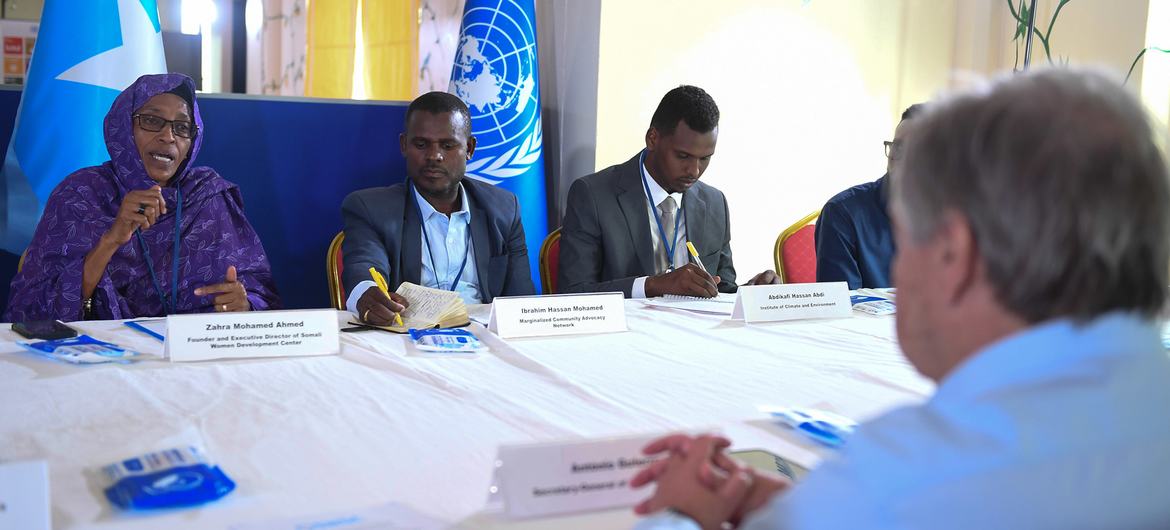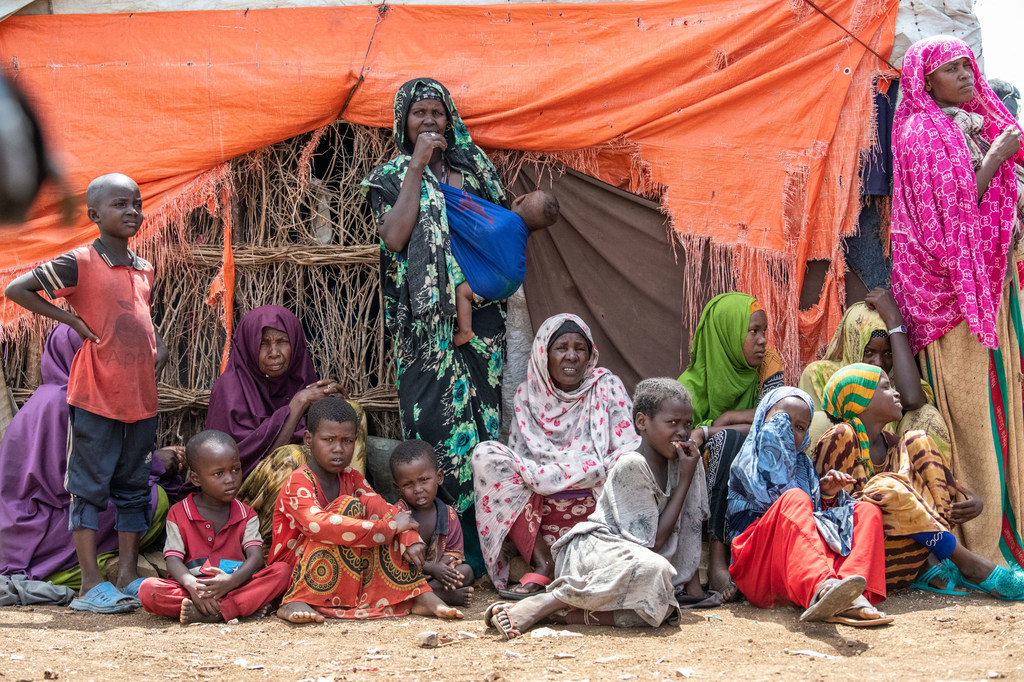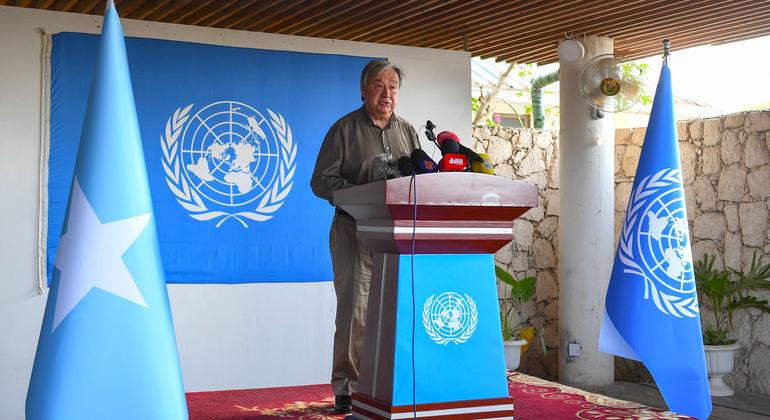“Somalia faces many challenges, but in the spirit of Ramadan, I also bring a message of hope and renewal – the United Nations stands in solidarity with the Somali people.
“Let us come together to advance peace and security, sustainable development and human rights – and build a better future for all Somalis,” the UN chief said.
He was addressing a news conference in the Somali capital, Mogadishu, on the second and last day of his visit to Somalia.
On Tuesday, the Secretary-General met with Somalia’s President Hassan Sheikh Mohamud and members of his cabinet and advisors, visited internally displaced families in South West State on a trip to Baidoa, and met separately with civil society organisations and the heads of UN agencies, funds and programmes working in support of Somalis.
Progress and support
In his remarks at the news conference, the UN chief noted that despite severe challenges, the people of Somalia continued to demonstrate enormous strength and resilience.
“During the six years since my last visit, we have seen progress on peace, security and sustainable development. In my talks with President Hassan Sheikh Mohamud and the Government yesterday, we discussed how the United Nations system can continue to support Somalia in building on this positive momentum,” Mr. Guterres said.
“I commended the President’s efforts to advance peace and security, and highlighted the importance of strong collaboration with Federal [Member] States to address the threats posed by Al-Shabaab,” he added. “The United Nations is committed to supporting national and regional efforts to protect human rights and combat terrorism and violent extremism.”
The UN chief highlighted the support of the African Union Transition Mission in Somalia (ATMIS), a multidimensional mission that includes military, police and civilian components, and which is mandated by the UN Security Council to assist Somali security forces in their fight against the Al-Shabaab terrorist group.
Civil society’s vision
While in Mogadishu, the Secretary-General also met with representatives of Somali civil society organisations working in women’s affairs and empowerment, climate change, persons with disabilities, youth and marginalised groups.
He told media representatives he was “deeply inspired by their vision and energy.”
“A safe and inclusive civic space is essential to good governance and can help prevent and reduce violence. The full participation of Somalia’s women and young people in political life – including the constitutional review – is critical,” Mr. Guterres said.
“I welcome the Government’s commitment to women’s rights and representation and call for the full implementation and codification of the 30 per cent quota for women in elections.”
During Somalia’s last electoral process, completed in 2022, there had been a goal of achieving a minimum of 30 per cent women’s representation in the federal parliament.
In the end, women took up just 21 per cent of parliamentary seats, down from 24 per cent of parliamentary seats in the 2016/17 electoral processes. The United Nations has previously said that meeting the 30 per cent quota is an important first step to full representation and an inclusive society in Somalia.

UN Secretary-General António Guterres meets with representatives of Somali civil society organisations in Mogadishu.
Humanitarian crisis
The Secretary-General’s last visit to Somalia, in 2017, was during a large-scale humanitarian operation to prevent famine. His visit this year came as Somalia grapples with a devastating drought which led to the deaths of 43,000 people in 2022 alone.
Urgent assistance is needed for some 8.3 million Somalis, according to the UN humanitarian affairs coordination office (OCHA). The drought has displaced 1.4 million Somalis – with women and children making up 80 per cent of these people. Food prices are rising and aggravating hunger and malnutrition.
“Today, the situation is once again alarming. Climate change is causing chaos. Somalia has experienced five consecutive poor rainy seasons, and this is unprecedented… Poor and vulnerable communities are pushed by the drought to the brink of starvation, and the situation can get worse,” Mr. Guterres said.
Between now and June, some 6.5 million Somalis are expected to face high levels of acute food insecurity, and the risk of famine is looming.
‘We must act now’
“We must act now to prevent a catastrophe. Yesterday, I visited Baidoa, and spoke to families who have lost their livelihoods to drought and insecurity – I am deeply moved by their struggles. I was also impressed by their resilience, their courage and their determination to rebuild their lives, but they cannot do it alone,” Mr. Guterres said.
“I strongly appeal to donors to stand with Somalis in their time of need,” he continued. “The international community has the responsibility and the interest to support Somalia with the resources needed to defeat Al-Shabaab, to build resilience and to [stabilise] the areas liberated and to provide much needed humanitarian assistance.”
Underfunded response
Somalia’s 2023 Humanitarian Response Plan, put together by OCHA and its humanitarian partners, identifies the most critical humanitarian needs in the country, proposes a response plan and determines the budget needed to address them.
This year’s Plan seeks $2.6 billion. So far, its funding levels stand at around 15 per cent, or $347 million.
“When famine looms, this is totally unacceptable. The international community must step up and dramatically increase the volume of funds to support Somalia in this moment of difficulty,” Mr. Guterres said.
“It is unconscionable that Somalis, who have done almost nothing to create the climate crisis, are suffering its terrible impact – just as they are beginning to emerge from years of conflict and insecurity.”
The UN chief’s two-day visit to Somalia was part of his annual tradition of paying solidarity visits to Muslim countries during the Holy Month of Ramadan, during which he joins in observing the related fast, and sharing an Iftar meal.

Residents of the ADC camp for internally displaced people in Baidoa, Somalia, where Secretary-General António Guterres made a solidarity visit to Muslim countries during the Holy Month of Ramadan.



